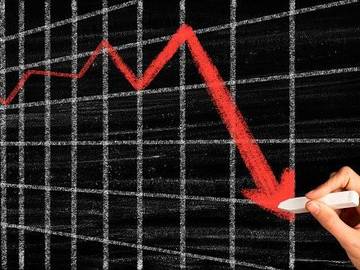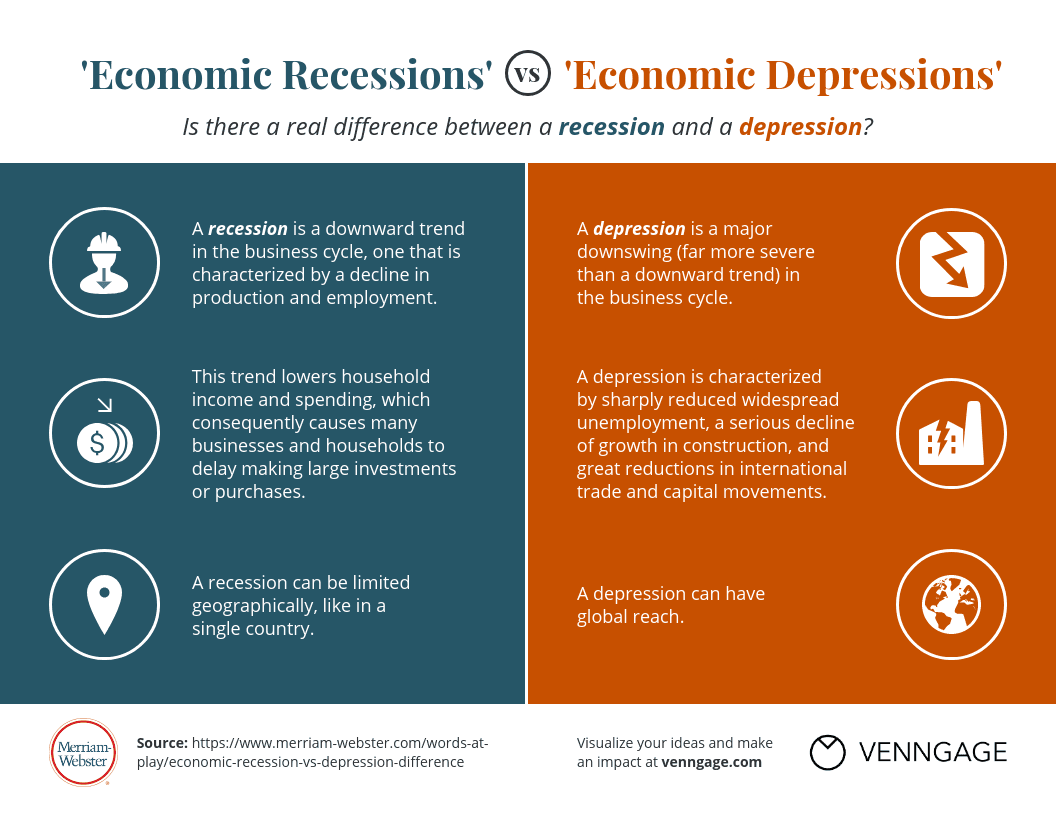What to KnowA recession is a downtrend in the economy that can affect production and employment, and produce lower household income and spending. The effects of a depression are much more severe, characterized by widespread unemployment and major pauses in economic activity. Recessions can also be more localized, while depressions can have global reach.

Stay tuned for a bonus lesson on bogus quotations.
People love to attribute well-known sayings to famous people of yore, and often will do so with a healthy disregard for facts, or the likelihood that any one person should have been responsible for coining so many widely quoted phrases. Oscar Wilde, Winston Churchill, and Mark Twain did not, we regret to inform you, come up with many of the famous things they are credited with having said. And neither Ronald Reagan nor Harry Truman was responsible for the joke about 'When your neighbor loses his job it’s a recession; it’s a depression when you lose yours.' As noted by Barry Popik, Fred Shapiro, and other quote-sleuths, this particular line has been in use since 1954, well before Truman was known to have used it.
As to the difference between a recession and a depression, Beck said: “I define a recession as when your neighbor loses his job, but a depression is when you lose your own.”
— The Daily News (New York, NY), 15 Feb. 1954
Historical Use and Jokes About Recessions and Depressions
This was not the first time that someone attempted to make a joke explanation about the difference between a recession and a depression; these jokes (using a very broad definition of the word joke) go back to at least the 1930s.
Everyone wants to know the difference between a depression and a recession when both have the same effect. Recession is simply the way the Democrats spell depression, explains the Topeka Capital.
— The Hutchinson News (Hutchinson, KS), 14 Mar. 1938A depression is when wages are cut so low no one makes enough to live on and a recession is when the price of everything goes up so high no one makes enough to live on.
— The Atlanta Constitution, 23 Jan. 1938The difference between a depression and a recession is that the first creates a class who expect the worst and the latter a class who sweat and expect what they’re getting.
— Lincoln Journal Star (Lincoln. NB), 31 Dec. 1937Lima Beane thinks the only difference between a recession and a depression is that one is a let-up and the other a let-down.
— Pittsburgh Post-Gazette, 21 Dec. 1937I have already learned the difference between a Recession, a Depression and a Panic. A Recession is where you tighten your belt; a Depression is when you haven’t any belt to tighten, and a Panic is when you have lost your pants.
— The Ephraim Enterprise (Ephraim, UT), 21 Jan. 1949
But people do not turn to the dictionary for cheap puns and bad jokes (we hope); they come in search of steely-eyed realism and hard truths. So here are some things we can tell you about recessions, depressions, and the differences between the two.
Is There a Real Difference?
A recession is a downward trend in the business cycle, one that is characterized by a decline in production and employment. This trend lowers household income and spending, which consequently causes many businesses and households to delay making large investments or purchases.
A depression is a major downswing (far more severe than a downward trend) in the business cycle; one which is characterized by sharply reduced industrial production, widespread unemployment, a serious decline or cessation of growth in construction, and great reductions in international trade and capital movements. Another difference between a recession and a depression, in addition to the severity and effects of each, is that recessions may be limited geographically (limited to a single country), whereas depressions (such as the Great Depression of the 1930s) can occur across many nations.
Now that the differences between a recession and a depression have been worked out we can all go back to our normal way of addressing this subject: making bad jokes and attributing them to people who probably never said them.
 Image by Venngage Infographic Maker.
Image by Venngage Infographic Maker.




